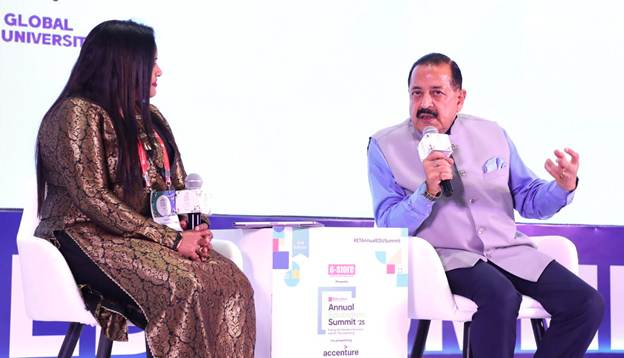India’s Tech Revolution: Jitendra Singh Hails 11 Years of Scientific Progress
“There was never a dearth of talent in this country—what we lacked was the ecosystem to support it,” Dr. Singh said.

- Country:
- India
In a compelling address at the Economic Times Education Summit 2025 held in New Delhi, Dr. Jitendra Singh, Union Minister of State (Independent Charge) for Science and Technology, Earth Sciences, and Minister of State for several key portfolios including the PMO, Space, and Atomic Energy, painted a visionary picture of India's scientific transformation over the last 11 years under Prime Minister Narendra Modi’s leadership.
Describing this period as a "revolutionary transformation," Dr. Singh highlighted how technology had permeated Indian households, reshaped governance, empowered youth, and positioned the nation as a global leader in science and innovation.
Operation Sindoor: A Symbol of Self-Reliant Scientific Strength
Dr. Singh opened his remarks by referencing the recent “Operation Sindoor”, an anti-drone and missile defence success, as a compelling illustration of India’s enhanced technological readiness and strategic capabilities. He attributed this success to the cumulative scientific advancements made over the past decade, underscoring India's growing ability to counter emerging security threats through indigenous innovation.
Empowering Talent Through an Enabling Ecosystem
“There was never a dearth of talent in this country—what we lacked was the ecosystem to support it,” Dr. Singh said. He praised the Modi government for unlocking critical sectors such as space and nuclear energy, which previously had limited participation, thereby creating an enabling environment for entrepreneurship, startups, and global collaboration.
These decisions, he asserted, had a “multiplier effect” across domains—agriculture, education, land records, defence, disaster response, and e-governance—thereby linking science to the everyday lives of citizens.
Youth, Aspirations, and the Rise of Innovation
Dr. Singh noted the emergence of India’s youth as the torchbearers of science and innovation, calling it a catalyst for ease of living and the ease of doing research. He emphasised that Indians abroad now embrace their heritage with pride, and India’s image as a powerhouse of science and technology is gaining global respect.
Space, Marine & Biotech: Engines of Economic Ascent
Projecting India’s path to becoming the fourth-largest economy, Dr. Singh pointed to the space, marine, and biotechnology sectors as key drivers of future growth. He particularly spotlighted the recently launched BIO-e3 Policy, which aims to usher in a biotech revolution with a focus on:
-
Economy
-
Employment
-
Environment
The Minister noted India’s trailblazing role in global health innovation, including the world’s first DNA-based COVID-19 vaccine and the largest vaccination drive ever undertaken.
India’s Moon Mission and International Collaboration
India's extraordinary space journey was another focal point. “Even though we were late starters, India became the first nation to reach the Moon’s South Pole with Chandrayaan-3,” Dr. Singh said proudly.
Looking forward, he highlighted the Axiom-4 mission, where Group Captain Shubhanshu Shukla will serve as Mission Pilot on the International Space Station (ISS)—a first for India. The mission will include indigenous biotechnology experiments, co-developed by ISRO and the Department of Biotechnology, focused on:
-
Space nutrition
-
Self-sustaining life support systems
-
Microgravity-compatible biotech kits
“These kits, conceptualized by Indian scientists, lay the groundwork for long-duration human spaceflight research,” Singh explained.
The Booming Space Economy and Startup Ecosystem
India’s space economy, currently valued at $8 billion, is projected to skyrocket to $44 billion in the coming years. Dr. Singh cited the explosion of space startups—from single digits in 2014 to over 300 today—with many developing globally competitive products and services.
He also predicted space medicine would be India’s next big frontier, noting early successes in medical research tailored to space environments.
Citizen-Centric Technology in Governance
Highlighting India's unique blend of technology and public service, Dr. Singh pointed to impactful innovations like:
-
Face Recognition for Pensioners, which allows elderly citizens to verify identity without physical strain
-
CPGRAMS (Centralized Public Grievance Redress and Monitoring System), which scaled from 2 lakh grievances in 2014 to 26 lakh today, becoming a global model for grievance redressal
Such technologies exemplify how India is integrating innovation into inclusive, empathetic governance.
Advocating a Hybrid AI-Human Model
While praising India’s AI advancements, Dr. Singh cautioned against exclusive reliance on AI, advocating instead for a hybrid model that blends Artificial Intelligence with human intelligence. This model, he argued, ensures that empathy, ethics, and integrity remain central to public service delivery.
Scientific Sovereignty as Strategic Power
Dr. Singh concluded by affirming that India’s science and research efforts are no longer just academic pursuits, but vital to the nation's strategic sovereignty, economic resilience, and global leadership.
“With PM Modi’s vision and decisive policy reforms, India has evolved into a nation where science shapes strategy, and innovation drives empowerment,” he said.
This thought-provoking session at the Education Summit 2025 reaffirmed that India’s scientific renaissance is not just underway—it is accelerating, powered by the collective aspirations of a nation committed to shaping its future through knowledge, technology, and global collaboration.










